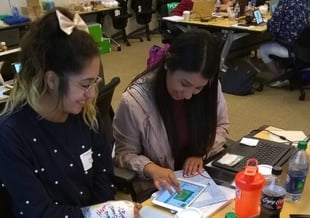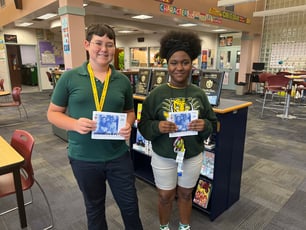Chevron partnered with Project Lead The Way in 2009 to bolster STEM education in communities throughout California, Hawaii, Louisiana, Mississippi, New Mexico, Ohio, Pennsylvania, Texas, Washington D.C., and West Virginia. Since the partnership began, Chevron has contributed to the education of students across the nation and has provided thousands of hours of teacher training. More than 177,950 students have had the opportunity to engage in PLTW’s transformative classroom experiences, and over 4,833 teachers have completed more than 123,000 hours of professional development, thanks to Chevron’s support.
Caitlin Hunter, who serves as community engagement specialist for Chevron’s Gulf of Mexico Business Unit, is responsible for the company’s education grants in the region and works closely with Project Lead The Way in her role.
In addition, Hunter’s daughter – pictured above – is a PLTW Launch student.
We recently had the opportunity to talk with Hunter about the Chevron-PLTW partnership, how PLTW has made an impact on her daughter, and more. Learn more in the excerpts from our conversation below:
PLTW: How does PLTW align with the work of Chevron’s Gulf of Mexico Business Unit?
Hunter: Our focus is to improve and expand access to quality, hands-on STEM education for at-risk youth, driving workforce and post-secondary readiness, which is largely impacted by partners like Project Lead The Way. STEM education is really giving students opportunities for great futures, and I feel very proud to play a role in helping to provide access to these opportunities.
PLTW: Why do you believe it's important for companies such as Chevron to partner with Project Lead The Way?
Hunter: Partnering with Project Lead The Way is really driving the needle forward. Take, for instance, my personal story.
I have an elementary school-aged daughter in the public school system in St. Tammany, and knowing that Project Lead The Way is in her school makes me feel very at ease.
This year, when we were getting ready for her to go back to school and talking about her favorite things, I asked, “What do you want to be when you grow up?” She said she wants to be an engineer, and I was like, “I'm so excited you said that!"
I don't pressure her one way or another about choosing her direction, but knowing that she is excited about engineering – what the field is all about, understanding how things work – and then later coming home and asking if she can join the robotics team makes me feel great.
The curriculum and the focus PLTW provides these young kids makes them excited about robotics. I see it every day. And seeing our daughter so curious and inspired is so meaningful to her father and me. We’re blessed that our daughter’s school has adopted and teaches PLTW Launch.
For schools that implement the program – it's sustainable, and it's only going to elevate the status of the school and the work of the students.
PLTW: What is your favorite or most memorable PLTW moment or experience?
Hunter: There have been a lot.
One of the most impactful moments was an opportunity I had to meet superintendents in the region, and they were sharing that 40 percent of their budget had been cut. When we suggested a grant opportunity to support the implementation of PLTW, their eyes lit up, their ears perked up, and they were very excited about the opportunity to be able to deliver STEM curriculum to kids this school year without impacting their budget further.
Another one of my favorite experiences was feedback from my daughter's school: The principal and vice principal told me their robotics team placed in state, thanks to PLTW! I was very overwhelmed with excitement: first, that the robotics program is successful and second, that the school implemented PLTW with so much energy behind it.


